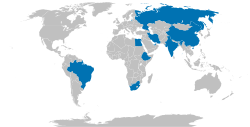
Back BRICS Afrikaans بريكس Arabic BRICS AST BRICS Azerbaijani БРИКС Bashkir БРІКС Byelorussian БРІКС BE-X-OLD БРИКС Bulgarian ব্রিক্স Bengali/Bangla BRICS BS
 BRICS logo during the 2025 Brazilian chairmanship | |
 | |
| Named after | First five member states' initials in English |
|---|---|
| Formation |
|
| Founded at |
|
| Type | Intergovernmental organization |
| Purpose | Political and economical |
| Fields | International politics |
| Membership | |
Formerly called | BRIC |
BRICS is an intergovernmental organization consisting of ten countries—Brazil, Russia, India, China, South Africa, Egypt, Ethiopia, Indonesia, Iran and the United Arab Emirates. It is considered to be a counterpart and alternative to the G7 bloc of the world's largest economies.
The term 'BRIC' was originally identified to highlight investment opportunities.[2] The grouping later evolved into a geopolitical and geoeconomic bloc,[3] with their governments meeting annually at formal summits and coordinating multilateral policies since 2009. Relations among BRICS are conducted mainly based on non-interference, equality, and mutual benefit.[4]
The founding countries of Brazil, Russia, India, and China held the first leaders summit in Russia in 2009 under the name BRIC. Following a renaming of the organization, South Africa attended its first summit as a member in 2011 after joining the group in 2010.[5][6] Iran, Egypt, Ethiopia, and the United Arab Emirates attended their first summit as member states at the 2024 summit in Russia.[7] Indonesia officially joined as a member state in early 2025, becoming the first Southeast Asian member.[8][9] The acronym BRICS+ has been informally used to reflect new membership.[7][3]
Some in the West consider BRICS institutions an alternative to institutions such as those led by nations of the G7 bloc, which consist of some of the leading economies[3]; others also describe the grouping as an incoherent joining of countries around increasing anti-Western and anti-American objectives.[10] Together BRICS has implemented competing initiatives such as the New Development Bank, the BRICS Contingent Reserve Arrangement, BRICS pay, the BRICS Joint Statistical Publication[11] and the BRICS basket reserve currency.[12] BRICS has received both praise and criticism from numerous commentators and world leaders.[13][14][15][16][17]
- ^ Staff writer (2024). "BRICS". UIA Global Civil Society Database. uia.org. Brussels, Belgium: Union of International Associations. Yearbook of International Organizations Online. Retrieved 24 December 2024.
- ^ "Goldman's BRIC Era Ends as Fund Folds After Years of Losses". Bloomberg. 8 November 2015. Archived from the original on 31 January 2023. Retrieved 10 November 2022.
- ^ a b c Patrick, Stewart (9 October 2024). "BRICS Expansion, the G20, and the Future of World Order". Carnegie Endowment for International Peace. Archived from the original on 19 November 2024. Retrieved 24 November 2024.
... To some in the West, the emergence of BRICS+ suggests something even more ominous—a world that is fragmenting into competing blocs, thanks to intensifying geopolitical rivalry between East and West and growing mutual alienation between North and South. According to this reading, Beijing and Moscow are intent on exploiting some countries' resentment of the United States and its wealthy world allies to consolidate an anti-Western counterweight to the venerable Group of 7 (G7), a process that is likely to paralyze global cooperation within other multilateral venues. ... From the outset, BRICS was conceived as a geopolitical and geoeconomic counterweight to the West ...
- ^ Gutemberg Pacheco Lopes Junior. "The Sino-Brazilian Principles in a Latin American and BRICS Context: The Case for Comparative Public Budgeting Legal Research; Wisconsin International Law Journal; 13 May 2015" (PDF). University of Wisconsin Law School. Archived (PDF) from the original on 30 September 2021. Retrieved 7 September 2016.
- ^ "What is BRICS, which countries want to join and why?". Reuters. Archived from the original on 18 November 2023. Retrieved 8 February 2024.
- ^ Oliver Stuenkel (2020). The BRICS and the Future of Global Order (2 ed.). Lexington Books. p. 1. ISBN 978-0739193211.
- ^ a b Cite error: The named reference
:7was invoked but never defined (see the help page). - ^ Cite error: The named reference
Reuters-1was invoked but never defined (see the help page). - ^ "Indonesia joins BRICS group of emerging economies". Al Jazeera. 7 January 2025. Retrieved 7 January 2025.
- ^ Can BRICS Finally Take On the West?, Foreign Policy, October 21, 2024.
- ^ "BRICS Joint Statistical Publications". Federal State Statistics Service. Archived from the original on 17 January 2024.
- ^ Raimondi, Paolo (2 September 2023). "BRICS: The role of the unit of account for the new "basket of currencies"". India Foundation. Archived from the original on 4 October 2023.
- ^ "ILO head praises BRICS countries' commitment to social dialogue". ILO. 3 August 2018. Archived from the original on 25 August 2023. Retrieved 25 August 2023.
- ^ Wolff, Richard D. (3 October 2022). "BRICS: the powerful global alliance". canadiandimension.com. Archived from the original on 25 August 2023. Retrieved 25 August 2023.
- ^ Maitra, Sumantra (18 April 2013). "BRICS – India is the biggest loser". USINPAC. Archived from the original on 28 October 2013. Retrieved 17 June 2013.
- ^ Blakeley, Grace (15 February 2023). "BRIC Nationalism Is No Alternative". Jacobin. Archived from the original on 25 August 2023. Retrieved 25 August 2023.
- ^ Coughlin, Con (24 August 2023). "Brics is now a motley crew of failing states". The Daily Telegraph. ISSN 0307-1235. Archived from the original on 25 August 2023. Retrieved 25 August 2023.